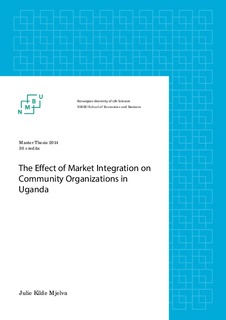| dc.contributor.author | Mjelva, Julie Kilde | |
| dc.date.accessioned | 2014-08-18T07:46:31Z | |
| dc.date.available | 2014-08-18T07:46:31Z | |
| dc.date.copyright | 2014 | |
| dc.date.issued | 2014-08-18 | |
| dc.identifier.uri | http://hdl.handle.net/11250/217384 | |
| dc.description.abstract | Community organizations play crucial roles in many Ugandan communities as they reduce poverty through building employment opportunities in the villages, educate on health, agriculture and leadership, and help villages develop though exploiting the benefits of cooperating. This study uses theory from the New Institutional Economics School and theories on collective action to investigate factors affecting community organizations in Uganda, and especially how the level of market integration of a community affects the community organizations. Hypotheses of the effect of market integration, ethnic homogeneity and income inequality on the number and activity level of community organizations are tested using panel data from the Living Standards Measurement Study – Integrated Surveys on Agriculture (LSMS-ISA) project by the World Bank. Additionally, qualitative data from own collected field interviews are used to investigate the factors influencing the change from informal cooperation to establishing community organizations and to complement the analysis of the findings from the quantitative models.
The results from the quantitative models weakly indicate that market-integrated communities have higher organizational activity than less market-integrated communities and that ethnical homogeneity of the community is positively related to the organizational activity of the community. These findings are also supported in the field interviews. Income inequalities do not seem to have a significant effect on the number or activity level of community organizations. Additional factors identified as influencing community organizations are NGO-presence and regional differences. Further, findings from the field interviews suggest that several community organizations struggle to get out of low-participation equilibrium where a too low number of contributing members constrains the possibility of benefiting from the organization and further constrains the interest among the community members of organizing. | nb_NO |
| dc.language.iso | eng | nb_NO |
| dc.publisher | Norwegian University of Life Sciences, Ås | |
| dc.subject | VDP::Samfunnsvitenskap: 200::Økonomi: 210::Samfunnsøkonomi: 212 | nb_NO |
| dc.subject | Community Organizations | nb_NO |
| dc.subject | Market Integration | nb_NO |
| dc.subject | Collective Action | nb_NO |
| dc.subject | New Institutional Economics | nb_NO |
| dc.title | The effect of market integration on community organizations in Uganda | nb_NO |
| dc.type | Master thesis | nb_NO |
| dc.source.pagenumber | 101 | nb_NO |
| dc.description.localcode | M-ECON | nb_NO |
